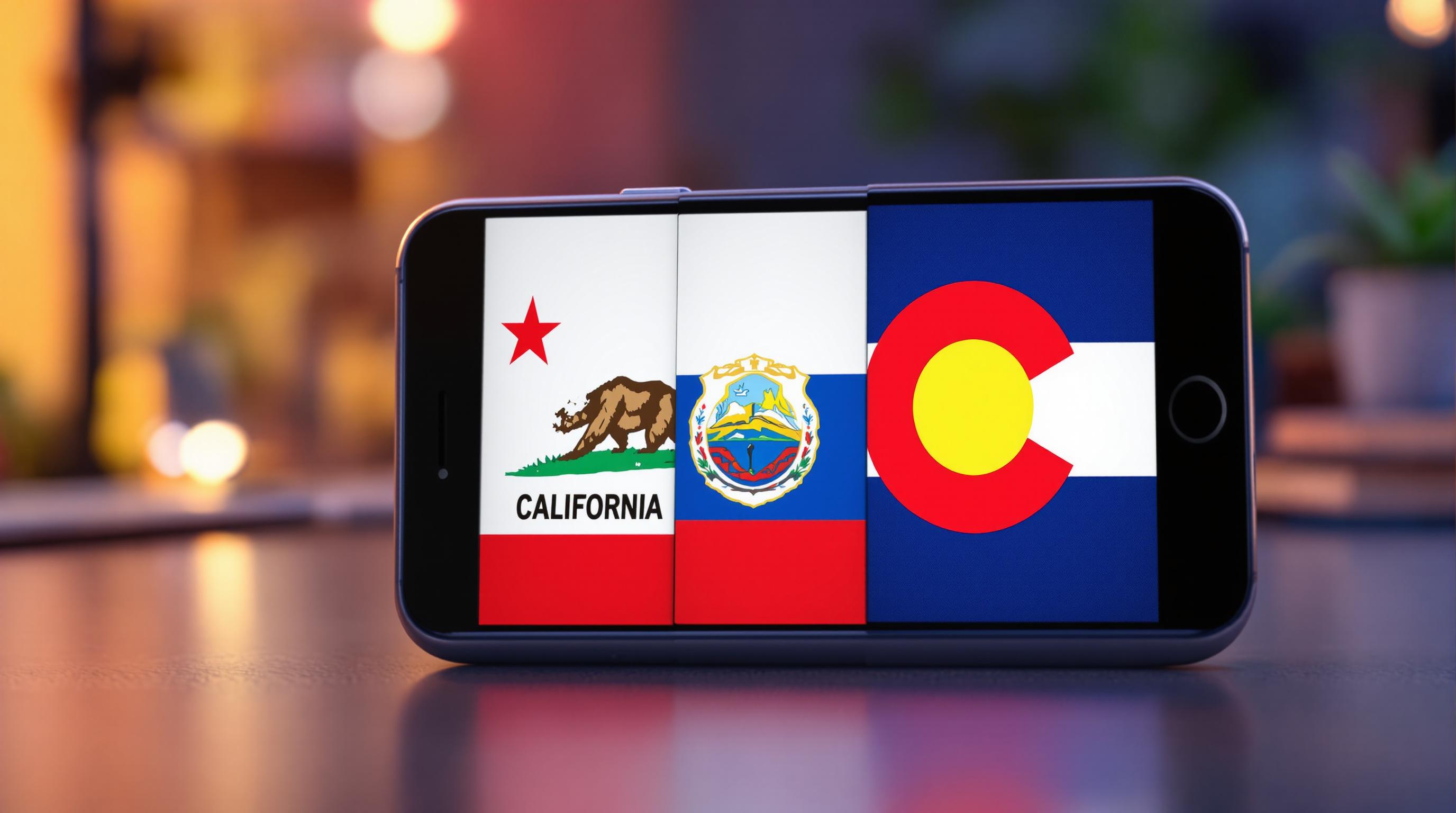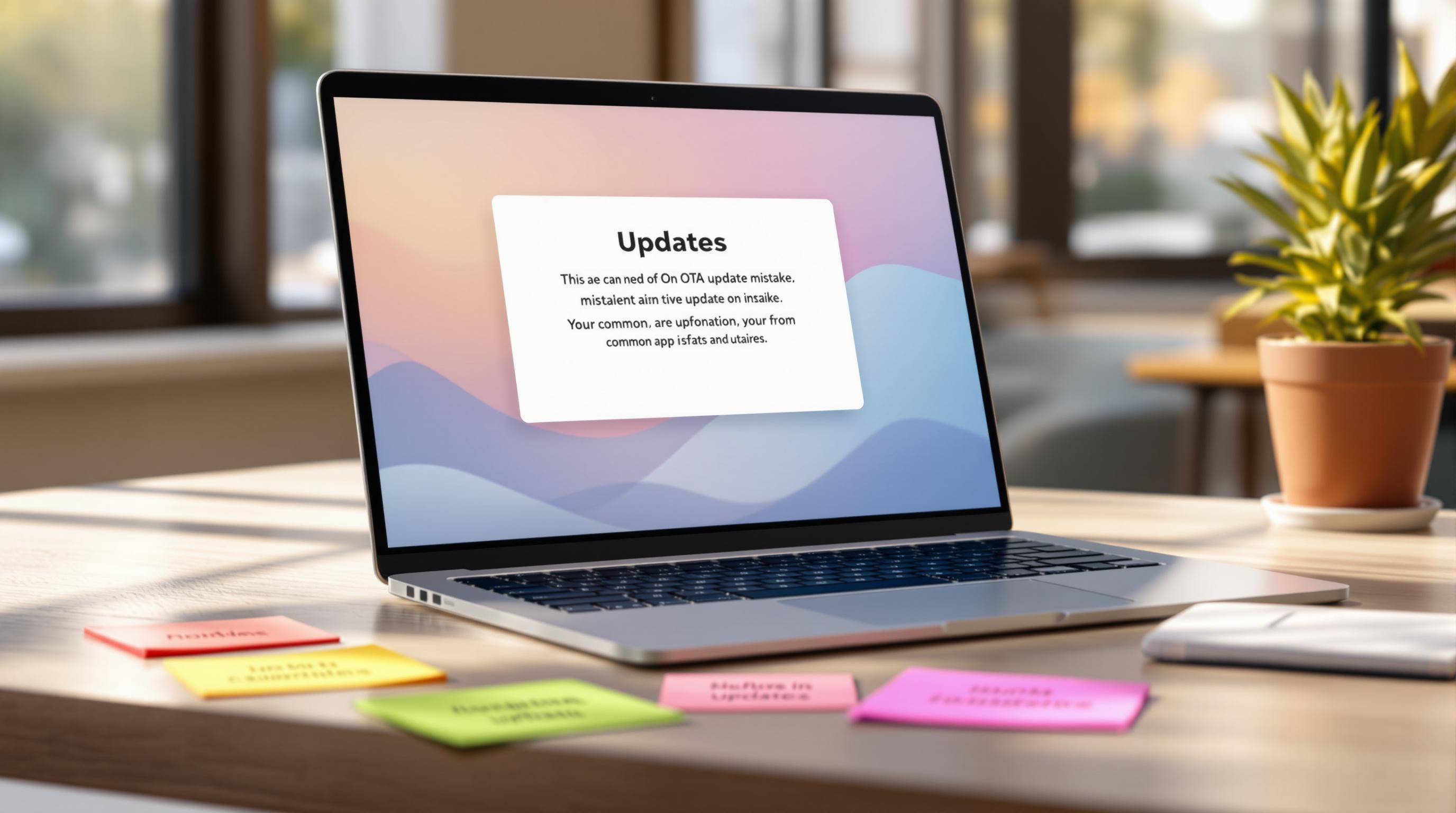Mobile app privacy laws vary across states, and understanding them is crucial for developers. Here’s a quick overview of the main privacy regulations in California, Virginia, and Colorado:
- California (CCPA/CPRA): Requires detailed disclosures, opt-out options for data sales, and strict rules for sensitive data. Users can access, delete, and correct their data.
- Virginia (VCDPA): Focuses on consent for sensitive data, reasonable security measures, and user rights like data access, deletion, and correction. No “Do Not Sell” button required.
- Colorado (CPA): Emphasizes opt-out options, consent for sensitive data, and mandatory privacy assessments for high-risk activities.
Quick Comparison
| State Law | Key Features | User Rights | Unique Requirements |
|---|---|---|---|
| CCPA/CPRA | Detailed data disclosures, opt-out for data sales, stricter rules for sensitive data | Access, delete, correct, transfer | Transparency for automated decision-making |
| VCDPA | Consent for sensitive data, reasonable security measures, vendor agreements | Access, delete, correct, portability | No “Do Not Sell” button required |
| CPA | Opt-out options, consent for sensitive data, privacy assessments | Access, delete, correct, transfer | Mandatory privacy risk assessments |
Failing to comply with these laws can lead to fines and reputational harm. Developers should focus on clear data notices, consent systems, and strong security practices to stay compliant.
2023 Privacy Update: Briefing on New State Data Privacy Laws
1. California Privacy Laws (CCPA/CPRA)
California leads the way in privacy regulations with its California Consumer Privacy Act (CCPA) and California Privacy Rights Act (CPRA), requiring developers to meet strict data standards.
The CCPA applies to businesses that meet at least one of these criteria:
- Annual revenue exceeds $25 million
- Processes data of 50,000 or more California residents
- Earns 50% or more of revenue from selling personal data
If your mobile app falls under these rules, you must disclose:
- The types of personal data collected
- Why the data is collected
- Any third parties the data is shared with
- How long the data will be retained
- User rights granted under California law
California residents have specific rights, including the ability to access, delete, correct, and transfer their personal data. They can also opt out of the sale of their data.
When it comes to sensitive data - such as geolocation, login details, financial information, biometric data, or health-related information - apps must follow stricter protocols. These include:
- Gaining explicit opt-in consent
- Implementing stronger security measures
- Limiting how long sensitive data is stored
- Restricting who can access this information
For apps that rely on automated decision-making, the CPRA requires transparency. Developers must explain how their algorithms work, why decisions are made, and how users might be affected.
California’s privacy laws not only set the standard within the state but also influence privacy policies across the country, shaping how developers approach compliance.
2. Virginia Data Protection Law (VCDPA)

Starting January 1, 2023, the Virginia Consumer Data Protection Act (VCDPA) applies to businesses that either handle or oversee personal data for at least 100,000 Virginia residents annually, or for 25,000 residents if at least half of their revenue comes from handling such data.
For mobile app developers, the law introduces several key requirements:
- Obtain clear consent before processing sensitive personal data.
- Implement reasonable security measures and maintain records of data processing activities.
- Have agreements in place with vendors managing personal data.
Virginia residents have specific rights under the VCDPA. They can access, delete, and correct their data, request a portable copy, and opt out of targeted advertising.
Unlike California’s privacy law, the VCDPA does not require a “Do Not Sell” button or disclosures about financial incentives tied to data use. While it doesn’t specify exact technical measures, it does require businesses to adopt reasonable security practices. Enforcement is handled by the Virginia Attorney General, who may impose civil penalties after giving businesses a chance to address issues.
This law aims to protect consumer data while offering businesses some flexibility. Mobile app developers working in Virginia should carefully evaluate their privacy policies to stay compliant and maintain user confidence.
3. Colorado Privacy Rules (CPA)

The Colorado Privacy Act (CPA) sets guidelines for data protection that impact businesses operating in Colorado. It applies to companies that meet certain data or revenue thresholds. For mobile app developers, this means following specific rules to safeguard personal information and ensure transparency in how data is handled.
Key requirements include:
- Opt-out options: Users must have a clear way to opt out of targeted advertising and data sales.
- Consent for sensitive data: Companies need to get user consent before collecting sensitive personal information.
- Detailed privacy notices: Developers must provide clear information about the types of data collected, why it’s processed, and whether it’s shared with third parties.
The CPA also emphasizes strong security practices like encryption, regular audits, incident response plans, and limiting data collection to what’s necessary.
Colorado residents gain several rights under this law, such as accessing, correcting, deleting, and transferring their personal data. They can also opt out of automated decision-making processes. One standout feature of the CPA is its requirement for businesses to conduct data protection assessments for high-risk processing activities. This step helps identify and address privacy risks. Unlike similar laws in California and Virginia, Colorado makes these assessments mandatory for high-risk data use.
The CPA pushes for better consumer privacy, stronger security, and greater transparency in mobile apps.
4. Capgo Privacy Standards

Capgo aligns with CCPA, VCDPA, and CPA, bridging the gap between state regulations and practical app development needs.
With end-to-end encryption, Capgo ensures user data stays secure during app updates. Impressively, 95% of active users receive updates securely within 24 hours, achieving an 82% global success rate [1].
Here’s how Capgo supports privacy compliance:
| Feature | Privacy Benefit | Compliance Support |
|---|---|---|
| End-to-End Encryption | Ensures only authorized users can decrypt updates | Meets data security standards across states |
| Granular Permissions | Allows controlled access for team members | Supports internal privacy management |
| Flexible Hosting | Offers cloud or self-hosted options | Addresses data residency requirements |
| User Assignment | Enables targeted update distribution | Facilitates consent-based feature rollouts |
For those worried about vendor dependencies, Capgo’s open-source structure provides transparency into how data is processed and managed.
“The only solution with true end-to-end encryption, others just sign updates” - Capgo [1]
Capgo’s effectiveness is clear: it’s trusted by 750 production apps, delivering 23.5M secure updates so far [1].
Track updates in real time with analytics, error monitoring, and role-based access controls to simplify compliance across multiple states.
State Laws: Benefits and Limitations
Here’s a breakdown of the strengths and weaknesses of key state laws governing data privacy. These insights build on previous discussions about state frameworks and practical compliance strategies:
| State Law | Strengths | Weaknesses |
|---|---|---|
| CCPA/CPRA | • Strong consumer rights • Clear penalties for data breaches • Detailed compliance instructions | • Complicated to implement • Expensive compliance process • Mostly affects larger companies |
| VCDPA | • Simplified consent rules • Clear categories for data processing • Includes a risk assessment framework | • Limited enforcement tools • Smaller scope compared to CCPA/CPRA • Fewer consumer rights |
| CPA | • Offers flexible compliance paths • Includes universal opt-out options • Requires regular assessments | • Vague technical requirements • Lacks detailed implementation guidance • Overlapping obligations can cause confusion |
To tackle these challenges, automated tools like Capgo simplify compliance tasks. With features such as end-to-end encryption and adaptable hosting, Capgo ensures data security across various regulatory landscapes.
“We practice agile development and @Capgo is mission-critical in delivering continuously to our users!” - Rodrigo Mantica [1]
Key Compliance Insights
- California (CCPA/CPRA): Delivers strong consumer protections but demands significant resources for compliance.
- Virginia (VCDPA): Offers clearer data processing rules but has fewer enforcement mechanisms.
- Colorado (CPA): Balances flexibility with accountability but lacks specific technical guidelines.
Capgo has proven effective in managing compliance across multiple states. Its targeted update system and fast 114ms download speed for a 5MB bundle allow developers to quickly address privacy updates [1]. With adoption by 750 production apps, Capgo shows its value in real-world use cases [1].
Impact on Development Practices
For developers, balancing rapid updates with compliance requirements is a critical challenge. Capgo’s integration with CI/CD pipelines makes it easier to roll out updates while staying aligned with various regulations. This streamlines workflows and ensures compliance across different jurisdictions.
Conclusion
State privacy laws like CCPA/CPRA, VCDPA, and CPA place distinct demands on mobile app developers. Each state has its own approach to data protection, with specific requirements and enforcement methods.
For developers, staying compliant across different jurisdictions means adopting strategies that can handle these varied demands. Speed and adaptability are key, as industry data shows that quick implementation of updates is essential to meet regulatory requirements[1].
To tackle these challenges, developers should concentrate on three key areas:
- Quick Update Systems: Set up processes that allow for fast implementation of privacy updates.
- Strong Security Measures: Ensure all data transfers and updates are protected with end-to-end encryption.
- Thorough Testing: Use staged rollouts and beta testing to confirm that privacy updates work as intended.
These approaches align with the specific challenges posed by state regulations and help ensure compliance.
With state privacy laws continuing to change, mobile app success increasingly depends on the ability to adapt. Currently, 750 production apps are managing these requirements effectively with automated compliance tools[1]. By applying these methods, developers can keep their apps compliant and ready for future changes.




